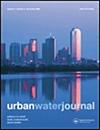Intelligent sewage discharge control in a wastewater treatment plant during rainfall periods
IF 1.6
3区 环境科学与生态学
Q3 WATER RESOURCES
引用次数: 3
Abstract
ABSTRACT Uncontrolled wastewater discharges have social and environmental consequences and generate increased operational costs. Wastewater treatment plants (WWTPs) are vulnerable infrastructure and require the implementation of risk and safety analyses in the context of climate change and flooding. Therefore, making decisions in changing weather conditions is one of the most important but also most difficult tasks for operators to maintain proper management of wastewater infrastructure facilities. The aim of the research was to develop a decision-making tool based on soft sensor methods to allow inflows to be classified into two classes of WTTP operating conditions. The quality of the regression models was maintained at 90.0%, while the classifier based on the coarse decision tree had a testing accuracy of 92.4%. The results can contribute to a reduction in wastewater load, which is significant in the context of ongoing climate change, and to an improvement in WWTP operation through automation.降雨期间污水处理厂污水排放的智能控制
未经控制的废水排放具有社会和环境后果,并增加了运营成本。污水处理厂(WWTPs)是脆弱的基础设施,需要在气候变化和洪水的背景下实施风险和安全分析。因此,对于运营商来说,在不断变化的天气条件下做出决策是对废水基础设施进行适当管理的最重要也是最困难的任务之一。研究的目的是开发一种基于软传感器方法的决策工具,将流入分为两类WTTP运行条件。回归模型的质量保持在90.0%,而基于粗决策树的分类器的测试准确率为92.4%。结果可以有助于减少废水负荷,这在持续的气候变化背景下是重要的,并通过自动化改善污水处理厂的运行。
本文章由计算机程序翻译,如有差异,请以英文原文为准。
求助全文
约1分钟内获得全文
求助全文
来源期刊

Urban Water Journal
WATER RESOURCES-
CiteScore
4.40
自引率
11.10%
发文量
101
审稿时长
3 months
期刊介绍:
Urban Water Journal provides a forum for the research and professional communities dealing with water systems in the urban environment, directly contributing to the furtherance of sustainable development. Particular emphasis is placed on the analysis of interrelationships and interactions between the individual water systems, urban water bodies and the wider environment. The Journal encourages the adoption of an integrated approach, and system''s thinking to solve the numerous problems associated with sustainable urban water management.
Urban Water Journal focuses on the water-related infrastructure in the city: namely potable water supply, treatment and distribution; wastewater collection, treatment and management, and environmental return; storm drainage and urban flood management. Specific topics of interest include:
network design, optimisation, management, operation and rehabilitation;
novel treatment processes for water and wastewater, resource recovery, treatment plant design and optimisation as well as treatment plants as part of the integrated urban water system;
demand management and water efficiency, water recycling and source control;
stormwater management, urban flood risk quantification and management;
monitoring, utilisation and management of urban water bodies including groundwater;
water-sensitive planning and design (including analysis of interactions of the urban water cycle with city planning and green infrastructure);
resilience of the urban water system, long term scenarios to manage uncertainty, system stress testing;
data needs, smart metering and sensors, advanced data analytics for knowledge discovery, quantification and management of uncertainty, smart technologies for urban water systems;
decision-support and informatic tools;...
 求助内容:
求助内容: 应助结果提醒方式:
应助结果提醒方式:


